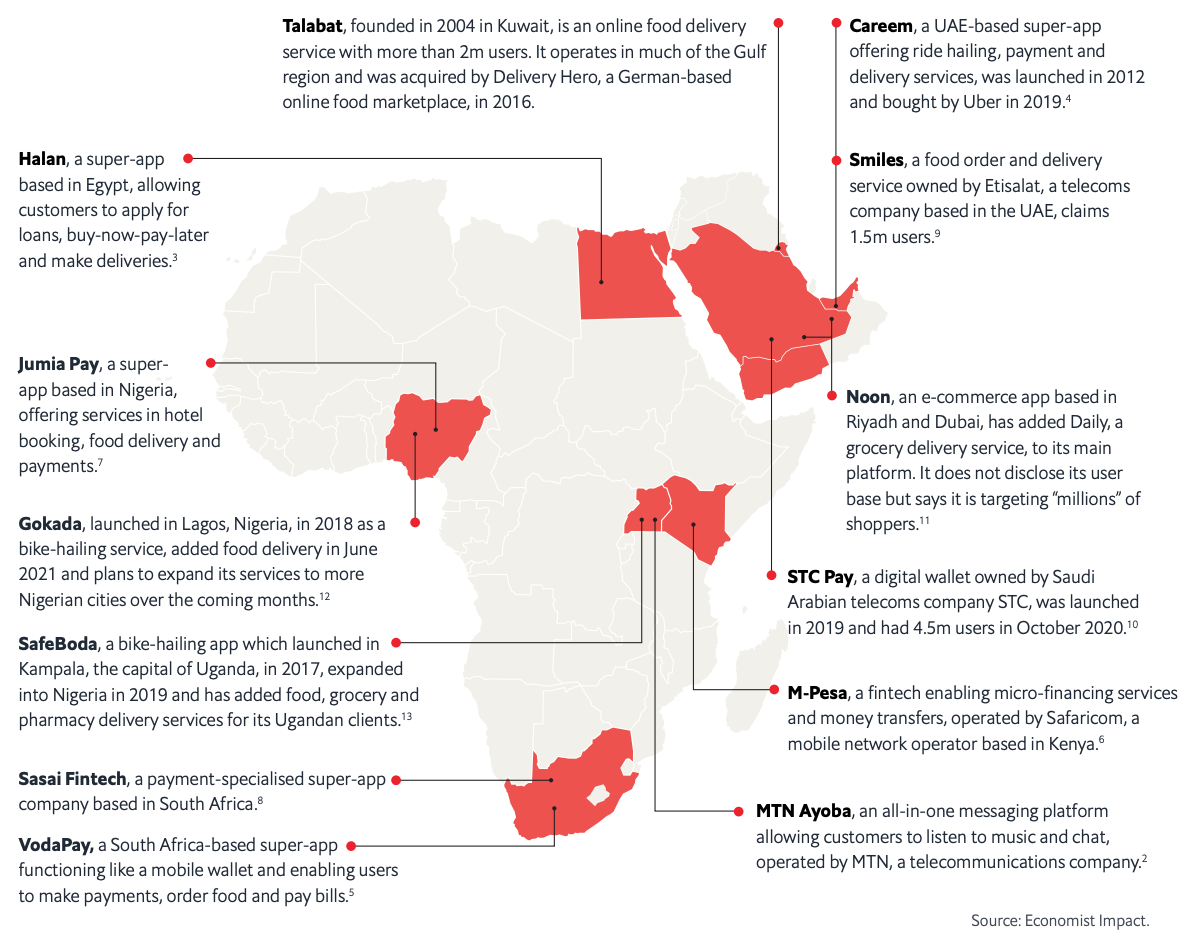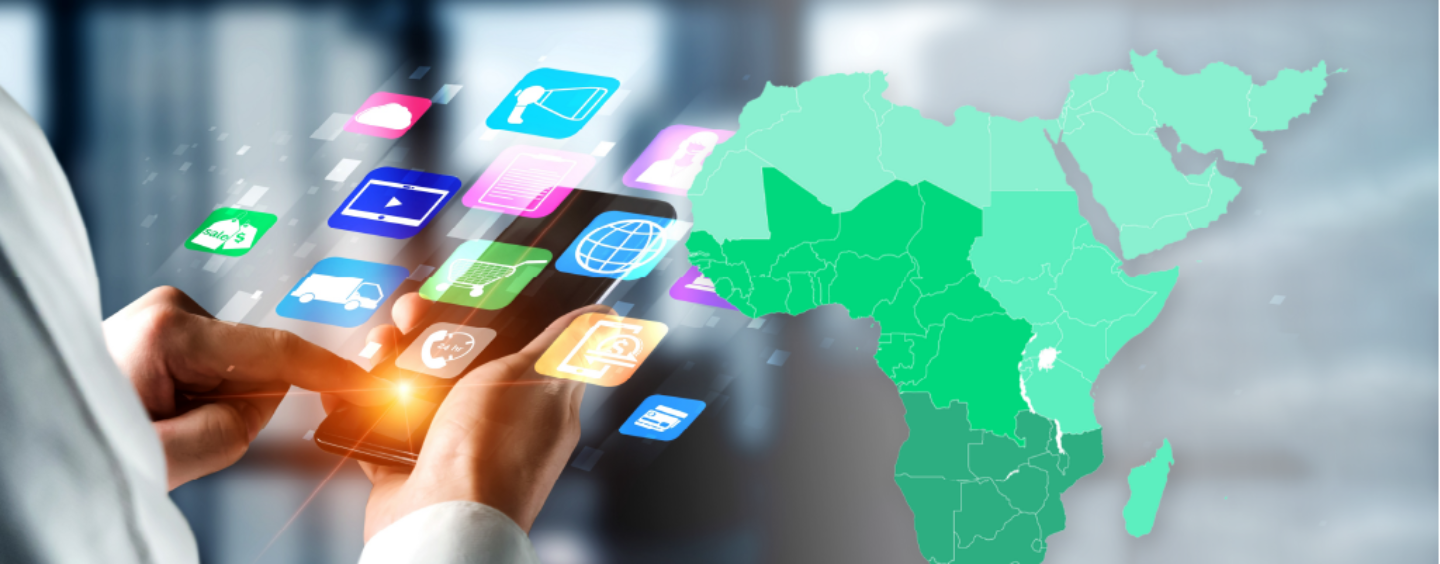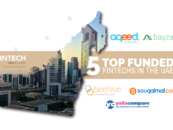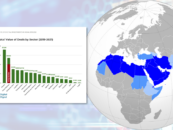Across the Middle East and Africa (MEA) region, a range of digital offerings are emerging and growing rapidly, striving to tap into the growth of Internet and smartphone penetration, the shift to digital channels and the rise of e-commerce to become the next super-app platform.
A report produced by Economist Impact and supported by Mastercard identifies at least seven super-apps in the region with considerable userbases and large digital ecosystems. An additional six digital platforms are rapidly gaining scale and poised to become super-apps, showcasing the traction these digital ecosystems and apps have received from consumers for the convenience and ease of use they provide.
According to the report, MEA’s super-apps and digital ecosystems have various shapes and sizes, with some pursuing an aggressive international scaling strategy, while others prioritize local expertise.
MEA’s super-apps
Among these players, Careem is one of the leaders in the field, the report notes. An early pioneer in the domain, Careem started out as a ride-hailing app back in 2012 before being bought out by Uber for a staggering US$3.1 billion in 2019. Since then, the platform has expanded to offer food and grocery delivery, micro-mobility, a digital wallet and a suite of fintech services, in addition to third-party services such as home cleaning, car rental and laundry.
In April, news broke that technology and investment group e&, previously known as Etisalat Group, had agreed to take a 50.03% stake in Careem in a transaction valued at US$400 million.
The deal will see the super-app be managed by Careem founders Mudassir Sheikha and Magnus Olsson, while the ride-hailing business, will be separated from the Careem super-app business and fully owned by Uber.
In Egypt, Halan followed a similar path, beginning its journey as a ride-hailing app before expanding to delivery, e-commerce, payments, and more. In 2021, the company merged with MNT Investments, a Netherlands-based microlending platform operating in Egypt, to further expand into financial services.
The buyout deal saw both companies adopt the name MNT-Halan which progressively expanded into a digital ecosystem connecting consumers, merchants and micro-enterprises with business loans, consumer finance, payments, buy now, pay later (BNPL) and e-commerce offerings.
Today, the company claims more than five million customers in Egypt, and more than US$2.5 billion in total loans disbursed.
Elsewhere in Africa, telco companies are becoming prominent players in the super-app space, tapping into their large mobile userbase to expand into the digital realm.
In Kenya, mobile network operator Safaricom launched in 2021 its M-Pesa Super App, providing customers with bill payments, e-commerce, international money transfers, and more. The new platform builds on the success of its M-Pesa SIM card-based money transfer and payment service, which crossed the threshold of 30 million monthly customers in Kenya last year.
In South Africa, mobile telco MTN runs a super-app called Ayoba, a platform that provides users with free access to an ecosystem of digital and media services through chat and call features, channels, micro-apps, and payment solutions.
Ayoba started out in 2019 as an instant messaging app but has grown to amass more than 25 million monthly active users. The platform, which claims a strong presence in Nigeria, Cameroon, South Africa, Ghana, Côte d’Ivoire, Uganda and The Republic of Congo, aims to achieve 100 million active users by 2025.
Other super-apps in MEA include Jumia Pay from Nigeria as well as Sasai Fintech and VodaPay from South Africa.
Emerging contenders
In addition to these established super-apps, the report notes a growing pool of contenders on the path of becoming super-apps. These companies are attracted by the scale, competitive market advantage and command of customer data that the super-app structure offers, the report says, and are adding new features and services aggressively.
At least six platforms are falling into the category, according to the report, and these platforms are growing at a fast pace.
In Kuwait, Talabat operates the largest food ordering and delivery services platform born out of the Middle East. The company, which operates in several markets including Kuwait, Saudi Arabia, the UAE, Oman, Bahrain, Qatar and Jordan, was acquired by Delivery Hero in 2016 and recently hit 100 million orders as well as 100+ million app downloads and over 70,000+ restaurant partners.
In Nigeria, Gokada launched as a ride hailing company in 2017, before diversifying into logistics and food delivery in 2020. The platform reportedly has 4,000 riders, making it the leader in Nigeria’s delivery scene. Currently headquartered in Lagos, Gokada is now in the process of expanding to other cities.
And in Uganda, SafeBoda was launched in 2017 as a bike-hailing app, before adding more services including food, grocery and pharmacy delivery services, airtime purchase, cashless payments, mobile money transactions, and a savings scheme.
SafeBoda claims a community of over 27,000 motorbike drivers that transport customers within the Kampala Metropolitan region. The company expanded into Nigeria in 2019.
In MEA, other digital platforms poised to become super-apps and highlighted in the report include Smile, a food order and delivery service owned by Etisalat; Noon, an e-commerce app based in Riyadh and Dubai; and STC Pay, a digital wallet owned by Saudi Arabian telco STC and which counts more than 4.5 million users.

MEA’s super-apps and emerging digital ecosystems, Source: The super-app model in the Middle East and Africa, Economist Impact
The rise of super-apps in MEA has been supported by global and local investors lining up to support the region’s next tech leaders. In February, MNT-Halan secured a massive US$400 million debt and equity financing, bringing its valuation past the billion dollar mark.
In Algeria, super-app Yassir pulled in US$150 million in a Series B in November 2022 to expand across MEA. The platform, which offers on-demand services such as ride-hailing, food and grocery delivery, and payments, claims eight million users and 100,000 partners consisting of drivers, couriers, merchants, suppliers and wholesalers.
Featured image credit: Edited from Freepik








No Comments so far
Jump into a conversationNo Comments Yet!
You can be the one to start a conversation.